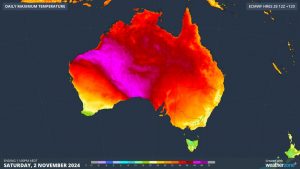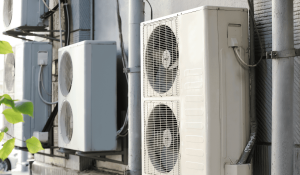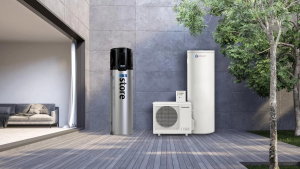Gas ducted heating is a popular heating system that is widely used in residential homes across Victoria. It provides efficient and effective heating by distributing warm air through a network of ducts installed in the walls, floors, or ceilings of a building. In this section, we will provide an introduction to gas ducted heating and explain how it works.
Gas ducted heating systems consist of a central heating unit, which is usually located outside or in a designated area of the building, and a network of ducts that distribute the heated air to different rooms or areas. The central heating unit is connected to a gas supply, which fuels the system and allows it to generate heat.
The heating process begins when the central heating unit ignites the gas and heats up the air. The heated air is then forced into the ducts by a fan, which pushes it through the ductwork and into the rooms. The warm air is released through vents or grilles, which are strategically placed in each room to ensure even distribution of heat.
One of the main advantages of gas ducted heating is its ability to provide consistent and comfortable heating throughout the entire building. The ductwork allows the heated air to reach every corner of the home, ensuring that no area is left cold. This is particularly beneficial in larger or multi-story homes where other heating systems may struggle to provide adequate warmth.
Gas ducted heating systems are also known for their quick heating capabilities. Unlike some other heating options, such as hydronic heating, gas ducted heating can quickly warm up a room or an entire building, making it ideal for those cold winter days when you need instant warmth.
Furthermore, gas ducted heating systems are highly efficient and cost-effective. Gas is a relatively inexpensive fuel source, and modern gas ducted heating systems are designed to maximize energy efficiency, ensuring that you get the most out of every unit of gas consumed.
In conclusion, gas ducted heating is a reliable and efficient heating system that provides consistent warmth throughout a building. It works by distributing heated air through a network of ducts, ensuring that every room is adequately heated. Gas ducted heating systems are quick to heat up and are cost-effective, making them a popular choice for many homeowners.
Benefits of Gas Ducted Heating Systems
Gas ducted heating systems offer numerous benefits that make them a popular choice for heating homes and commercial spaces. Here are some of the key advantages of gas ducted heating systems:
- Efficient Heating: Gas ducted heating systems provide efficient and effective heating throughout the entire space. The system distributes warm air evenly through ducts, ensuring that every room receives the desired temperature. This eliminates cold spots and provides consistent warmth throughout the building.
- Cost-effective: Gas ducted heating systems are known for their cost-effectiveness. Gas is generally cheaper than electricity, making gas ducted heating a more affordable option in the long run. Additionally, the energy efficiency of these systems helps to reduce energy consumption and lower utility bills.
- Quick Heating: Gas ducted heating systems heat up quickly, allowing you to enjoy a warm and comfortable environment in a short amount of time. This is particularly beneficial during cold winter months when you need immediate warmth upon entering your home or office.
- Zoning Capability: Gas ducted heating systems often come with zoning capabilities, allowing you to control the temperature in different areas or rooms independently. This means you can customize the heating according to your preferences and only heat the areas that are in use, saving energy and reducing costs.
- Environmentally Friendly: Gas ducted heating systems are considered more environmentally friendly compared to other heating options. Natural gas is a cleaner-burning fuel compared to coal or oil, resulting in lower greenhouse gas emissions. Additionally, the energy efficiency of these systems helps to reduce overall energy consumption and minimize the carbon footprint.
- Versatility: Gas ducted heating systems can be installed in both new and existing buildings, making them a versatile heating solution. They can be easily integrated into the existing ductwork or installed as part of a new construction project.
In conclusion, gas ducted heating systems offer a range of benefits including efficient heating, cost-effectiveness, quick heating, zoning capabilities, environmental friendliness, and versatility. These advantages make gas ducted heating systems a popular choice for both residential and even commercial spaces, providing comfort and warmth during the colder months while also being energy-efficient and environmentally friendly.
Installation Process of Gas Ducted Heating Systems
The installation process of gas ducted heating systems is an important aspect to consider when deciding to invest in this heating option. Understanding the installation process can help homeowners make informed decisions and ensure a smooth and efficient installation.
The first step in the installation process is to assess the home’s heating needs and determine the appropriate size and capacity of the gas ducted heating system. This involves considering factors such as the size of the home, insulation levels, and the number of rooms that need to be heated. A professional heating technician or rep can help with this assessment.
Once the appropriate system size is determined, the next step is to install the gas ducted heating unit itself. This typically involves placing the unit in a suitable location, such as the roof space or under the floor, depending on the design of the home. The unit is then connected to a network of ducts that distribute the heated air throughout the house.

The ductwork installation is a crucial part of the process. The ducts need to be properly sized and strategically placed to ensure even heating throughout the home. They should be insulated to minimize heat loss and noise transmission. The installation of vents and registers in each room is also necessary to allow the heated air to flow into the living spaces.
In addition to the main unit and ductwork, the installation process may also involve connecting the gas supply to the heating system. This requires the expertise of a licensed gas fitter to ensure safety and compliance with regulations.
Once the installation is complete, the system needs to be tested to ensure it is functioning properly. This includes checking for any leaks in the ductwork, verifying the airflow in each room, and testing the thermostat and controls.
It is important to note that the installation process of gas ducted heating systems should be carried out by qualified professionals. Hiring experienced technicians ensures that the system is installed correctly and safely, maximizing its efficiency and longevity.
In conclusion, the installation process of gas ducted heating systems involves assessing heating needs, selecting the appropriate system size, installing the main unit and ductwork, connecting the gas supply, and testing the system. Hiring qualified professionals for the installation is crucial to ensure a smooth and efficient process. By understanding the installation process, homeowners can make informed decisions and enjoy the benefits of gas ducted heating in their homes.
Cost of Gas Ducted Heating Systems
When considering the installation of a gas ducted heating system, one of the key factors that people are interested in is the cost. Understanding the cost involved can help individuals make informed decisions about whether gas ducted heating is a viable option for their homes or businesses.
The cost of gas ducted heating systems can vary depending on several factors. These factors include the size of the property, the number of rooms that need heating, the complexity of the installation process, and the specific brand and model chosen.
In general, the cost of a gas ducted heating system includes the purchase of the heating unit itself, the installation process, and any additional components or accessories required. It is important to note that the cost of installation may also include any necessary modifications to the existing ductwork or ventilation system.
While it is difficult to provide an exact cost estimate without specific details, it is possible to provide a general range. On average, the cost of a gas ducted heating system can range from $4,000 to $10,000 or more. This cost includes both the equipment and installation.
It is important to consider the long-term cost savings that can be achieved with gas ducted heating systems. Gas is generally a more cost-effective fuel source compared to electricity, which means that operating a gas ducted heating system can result in lower energy bills over time.
Additionally, gas ducted heating systems are known for their energy efficiency. This means that they can effectively heat a property while using less energy compared to other heating options. As a result, homeowners and businesses can save money on their energy bills while enjoying a comfortable indoor environment.
In conclusion, the cost of gas ducted heating systems can vary depending on various factors. However, it is important to consider the long-term cost savings and energy efficiency benefits that these systems offer. By understanding the cost involved, individuals can make informed decisions about whether gas ducted heating is the right choice for their heating needs.
Energy Efficiency of Gas Ducted Heating Systems
When it comes to heating systems, energy efficiency is a crucial factor to consider. Gas ducted heating systems are known for their high energy efficiency, making them a popular choice among homeowners.

Gas ducted heating systems work by using natural gas to heat the air, which is then distributed throughout the house via ducts. This method of heating is highly efficient because gas is a clean-burning fuel that produces a significant amount of heat. Compared to other heating options, such as electric ducted heating, gas ducted heating systems are more energy-efficient and cost-effective.
One of the main reasons why gas ducted heating systems are energy-efficient is because they can be zoned. This means that you can control the temperature in different areas or zones of your home independently. By only heating the areas that are in use, you can save energy and reduce your heating costs. For example, if you’re only using the living room during the day, you can set the temperature lower in the bedrooms and other unused areas, or you can completely turn off the heating for those areas by turning off the zone.
Additionally, gas ducted heating systems often come with programmable thermostats, allowing you to set specific temperatures for different times of the day. This feature helps optimize energy usage by automatically adjusting the temperature based on your schedule. For example, you can set the system to lower the temperature when you’re away from home and raise it before you return, ensuring comfort while minimizing energy waste.
Furthermore, gas ducted heating systems are designed to distribute heat evenly throughout the house. This eliminates cold spots and ensures that every room is heated efficiently. By maintaining a consistent temperature throughout your home, you can avoid wasting energy on overheating certain areas.
In terms of environmental impact, gas ducted heating systems are also considered more eco-friendly compared to other heating options. Natural gas is a cleaner fuel source compared to coal or oil, resulting in lower greenhouse gas emissions. This makes gas ducted heating systems a greener choice for those who are conscious of their carbon footprint.
In conclusion, gas ducted heating systems offer high energy efficiency due to their ability to be zoned, programmable thermostats, and even heat distribution. They are a cost-effective and environmentally friendly heating option for homeowners.
Maintenance Tips for Gas Ducted Heating Systems
Proper maintenance is essential to ensure the optimal performance and longevity of gas ducted heating systems. Here are some maintenance tips to keep your system running smoothly:
- Regular Cleaning: Dust and debris can accumulate in the ducts and vents over time, reducing the system’s efficiency. It is important to clean the ducts and vents regularly to remove any build-up. You can use a vacuum cleaner or a soft brush to clean the vents and a damp cloth to wipe the ducts.
- Return Air Filter Replacement: The return air filter in a gas ducted heating system helps to trap dust and other particles, preventing them from entering the system. Over time, the filter can become clogged, affecting the airflow and efficiency of the system. It is recommended to replace the air filter every three to six months, or more frequently if you have pets or allergies.
- Check for Leaks: Inspect the ductwork for any leaks or gaps that may be causing air to escape. Leaks can lead to energy wastage and reduced heating efficiency. Seal any leaks using duct tape or mastic sealant to ensure that the heated air is properly distributed throughout your home.
- Service & Maintenance: It is advisable to have a professional technician inspect and service your gas ducted heating system every 1-2 years. They can identify any potential issues, such as gas leaks or faulty components, and perform necessary repairs or maintenance tasks. Regular inspections can help prevent major breakdowns and ensure the safety of your system.
- Keep Surrounding Area Clear: Make sure that the area around your gas ducted heating system is clear of any obstructions. Remove any objects or debris that may be blocking the vents or obstructing the airflow. This will help the system operate efficiently and prevent any potential fire hazards.
By following these maintenance tips, you can ensure that your gas ducted heating system operates at its best, providing you with reliable and efficient heating throughout the colder months. Regular maintenance not only improves the system’s performance but also extends its lifespan, saving you money on costly repairs or replacements.
Troubleshooting Common Issues with Gas Ducted Heating Systems
Gas ducted heating systems, like any other heating system, can sometimes encounter issues that may affect their performance. In this section, we will discuss some common problems that homeowners may face with their gas ducted heating systems and provide troubleshooting tips to help resolve these issues.
One common issue with gas ducted heating systems is uneven heating throughout the house. This can be caused by various factors, such as blocked or dirty air filters, leaky ducts, or improper zoning. To troubleshoot this problem, start by checking and cleaning the air filters. If the issue persists, it may be necessary to inspect the ductwork for any leaks or blockages. Additionally, ensuring that the zoning system is properly set up and functioning can help distribute heat evenly throughout the house.
Another common problem is a lack of heat or no heat at all. This can be caused by a variety of issues, including a malfunctioning thermostat, a faulty gas valve, or a pilot light that has gone out. To troubleshoot this problem, start by checking the thermostat settings and ensuring that it is set to the desired temperature. If the thermostat appears to be functioning correctly, check the gas valve to ensure it is open and supplying gas to the system. If the pilot light has gone out, relighting it according to the manufacturer’s instructions should resolve the issue.
In some cases, gas ducted heating systems may produce strange noises, such as rattling or banging sounds. These noises can be caused by loose components, such as ductwork or fan blades, or a malfunctioning blower motor. To troubleshoot this problem, inspect the system for any loose components and tighten or replace them as necessary. If the noises persist, it may be necessary to contact a professional technician to inspect and repair the blower motor.
It is important to note that while some troubleshooting can be done by homeowners, it is always recommended to seek professional assistance for complex issues or if you are unsure about performing any repairs yourself. Regular maintenance and servicing of gas ducted heating systems can also help prevent and identify potential issues before they become major problems.
By understanding and addressing these common issues, homeowners can ensure that their gas ducted heating systems continue to provide efficient and reliable heating throughout their homes.
Comparison of Gas Ducted Heating with Electric Ducted Heating
When it comes to choosing a heating system for your home, it’s important to consider all the available options and compare their features and benefits. Gas ducted heating and electric ducted heating are two popular choices, each with its own advantages and considerations.
One of the main differences between gas ducted heating and electric ducted heating is the source of energy they use. Gas ducted heating systems rely on natural gas or LPG, while electric ducted heating systems use electricity. This difference in energy source can have an impact on the cost and efficiency of the heating system.
In terms of cost, gas ducted heating systems are generally more cost-effective to run compared to electric ducted heating systems. Natural gas and LPG are often cheaper than electricity, resulting in lower energy bills. However, it’s important to consider the initial installation cost, as gas ducted heating systems may require additional infrastructure such as gas lines or storage tanks.
When it comes to energy efficiency, both gas and electric ducted heating systems can be efficient options. Gas ducted heating systems are known for their high energy efficiency, as they can provide instant heat and distribute it evenly throughout the home. On the other hand, electric ducted heating systems may have lower energy efficiency due to potential heat loss during the conversion of electricity to heat.
Another factor to consider is the environmental impact. Gas ducted heating systems produce greenhouse gas emissions, while electric ducted heating systems do not. If reducing your carbon footprint is a priority, electric ducted heating may be a more environmentally friendly choice.
In terms of performance, both gas and electric ducted heating systems can provide effective heating for your home. However, gas ducted heating systems are often praised for their ability to heat larger spaces more quickly, making them ideal for larger homes or open-plan living areas.
Ultimately, the choice between gas ducted heating and electric ducted heating will depend on your specific needs and preferences. It’s important to consider factors such as cost, energy efficiency, environmental impact, and performance when making your decision. Consulting with a reputable professional in gas ducted heating services can also provide valuable insights and recommendations based on your individual circumstances.
Comparison of Gas Ducted Heating with Hydronic Heating
Another choice to consider is hydronic heating. When compared with gas ducted heating, each has its own advantages and disadvantages. Let’s take a closer look at how these two heating systems compare.
Gas ducted heating operates by heating air and distributing it throughout your home via a network of ducts. On the other hand, hydronic heating uses heated water to warm your home, which is circulated through pipes and radiators or underfloor heating systems.
One of the main differences between gas ducted heating and hydronic heating is the method of heat distribution. Gas ducted heating provides warm air through vents, which can quickly heat up a room. Hydronic heating, on the other hand, provides a more gentle and consistent heat, as the heated water radiates warmth throughout the space.
Another difference is the level of control and zoning options. Gas ducted heating allows you to control the temperature in different zones of your home, ensuring that each area is heated to your desired level. Hydronic heating also offers zoning options, but it may require more complex installation and additional equipment.
In terms of energy efficiency, both gas ducted heating and hydronic heating can be efficient options. Gas ducted heating systems have improved in recent years, with higher energy star ratings and the ability to zone different areas of your home. Hydronic heating systems are known for their energy efficiency, as they can be easily controlled and adjusted to maintain a comfortable temperature.
When it comes to installation and maintenance, gas ducted heating systems are generally easier and less expensive to install compared to hydronic heating systems. Gas ducted heating systems also require less maintenance, as they do not have water pipes or radiators that may require regular checks and maintenance.
In conclusion, both gas ducted heating and hydronic heating have their own advantages and disadvantages. Gas ducted heating offers quick and efficient heating with the ability to control different zones, while hydronic heating provides a gentle and consistent warmth throughout the space. Consider your specific needs and preferences when choosing between these two heating options for your home.
Recommendations for Reputable Brands and Professionals in Gas Ducted Heating Services
When it comes to installing or maintaining a gas ducted heating system, it is crucial to rely on reputable brands and professionals who specialize in this field. Here are some recommendations to help you find the right experts for your gas ducted heating needs.
- Research and Reviews: Start by conducting thorough research on reputable brands and professionals in your area. Look for customer reviews and ratings to get an idea of their reputation and the quality of their services. Online platforms and forums dedicated to home improvement and heating systems can be valuable resources for finding recommendations.
- Seek Recommendations: Reach out to friends, family, and neighbours who have gas ducted heating systems installed in their homes. Ask about their experiences and if they can recommend any reliable brands or professionals. Personal recommendations can often be the most trustworthy and reliable sources of information.
- Check Credentials: Ensure that the brands and professionals you consider have the necessary licenses, certifications, and insurance. This will give you peace of mind knowing that they have the expertise and qualifications to handle gas ducted heating systems safely and effectively.
- Experience and Expertise: Look for brands and professionals with extensive experience in installing and maintaining gas ducted heating systems. An experienced provider will have a better understanding of the intricacies involved in these systems and will be able to offer reliable and efficient services.
- Free Consultations and Quotes: Many reputable brands and professionals offer free consultations and quotes. Take advantage of these opportunities to discuss your requirements, ask questions, and get a clear understanding of the services they offer and the associated costs. This will help you make an informed decision and compare different options.
- Warranty and After-Sales Support: Consider brands and professionals who offer warranties on their products and services. A warranty ensures that you are protected in case of any issues or defects. Additionally, inquire about their after-sales support and maintenance services to ensure that you can rely on them for any future needs.
By following these recommendations, you can find reputable brands and professionals who will provide reliable and efficient gas ducted heating services. Remember to prioritize quality, expertise, and customer satisfaction when making your decision.










